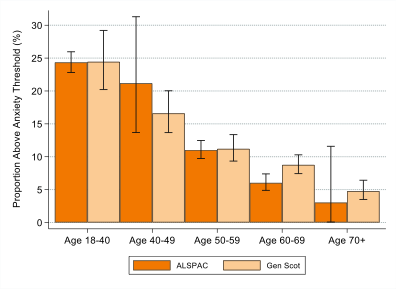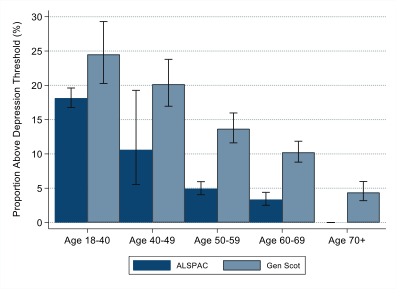Young people found to have poorer mental health during COVID-19
Generation Scotland and CovidLife volunteer data supports new findings that certain groups are more at risk of poorer mental health during COVID-19 than others.

A new study, conducted by researchers at the University of Bristol and Edinburgh has found that certain groups of people were at greater risk of increased anxiety or depression during COVID-19. This remains the same, even after accounting for volunteers' previous history of depression and anxiety. These groups are:
- Young people
- Women
- People with pre-existing mental and physical health conditions
- People living alone during the pandemic
- People self-isolating as a result of COVID-19
- People who experienced recent financial problems before the pandemic.
Interestingly, some factors were only linked to greater depression, such as living alone. Others only linked to anxiety, such as being a parent. Researchers did not find evidence of an increased risk of anxiety in key workers or healthcare workers. These findings were seen in Generation Scotland volunteers and both the younger and older generations of the Bristol's Children of the 90's project. This implies these effects may not be universal across parts of the UK.
Researchers are now looking at why some groups of people may have poorer mental health during the pandemic and the role of worries and health behaviours such as sleep and exercise levels. A further questionnaire examining the impact of the England’s second lockdown is planned for December, by Bristol's Children of the 90's.
This study shows beyond doubt how COVID-19 is affecting mental health, particularly in younger people. The strength of the study is really three-fold. First, both Bristol's Children of the 90's and Generation Scotland had mental health measures from before and repeat measures during the pandemic. Second, each cohorts findings echo the other. Third, the findings are not a quirk of locality – young adults in both Scotland and around Bristol were similarly affected. The study shows that indirect effects of COVID-19 are profound and widespread and felt most acutely by young adults. They as much as any group will bear the long-term brunt of the COVID experience and post-pandemic recovery.

Bristol's Children of the 90's work also found that the number of young people with anxiety doubled from 13% to 24%, during early stages of COVID-19. It showed that people aged 27-29 reported higher levels of anxiety during the early phases of the pandemic. This was higher than their parents. Researchers also found that anxiety levels continued to remain high, even when lockdown restrictions were eased in June. Therefore, a similar situation is expected this winter.
The highly detailed questionnaire data from these amazing longitudinal studies reveal a worrying rise in young people’s anxiety – this looks like it is due to the pandemic itself and potentially the societal and economic fallout caused by the lockdown measures used to control the spread of the virus. Evidence suggests this is not going to be a short-term issue and that mental health support and interventions are urgently required to reduce some of the mental health inequalities that have emerged.”
We'd like to thank all of the Generation Scotland volunteers, who took part in the CovidLife survey, for their help in making this research happen.
The paper was published by Alex Kwong and colleagues in The British Journal of Psychaitry. Read the paper here:
Mental health before and during COVID-19 in two longitudinal UK population cohorts

